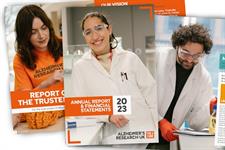Income at Alzheimer’s Research UK rose by almost 20 per cent last year to a record high, latest figures show.
The charity’s annual accounts for the year ending March 2023 show income of £49.9m, up from £42.2m in the previous year.
This reflects a continuing trend of growth at the charity – its income has more than tripled since 2013/14, when it was £14.2m.
The charity’s increase in income in 2022/23 was mostly the result of an increase in donations and legacies.
They were up by £7.7m to £47m as ARUK attracted about 20,000 new donors over the year.
The charity’s total expenditure for 2022/23 was £42.6m, a slight rise from last year’s £41.5m.
This spending includes £28.9m on dementia research activities and £13.7m on raising funds.
According to the charity’s annual report, researchers funded by the charity published more than 500 scientific papers revealing findings about the diseases that cause dementia.
Hilary Evans, chief executive of Alzheimer’s Research UK, told Third Sector that this year’s record income was a “landmark” for the charity, noting that when she became chief executive a decade ago its income was below the £10m mark.
“It’s also a really significant point in the fight against dementia, because this is the year we’ve seen, for the first time, two positive drug trials for disease-modifying treatments.
“So I think the tipping point we’re at with the disease is one of the things that’s helping in terms of awareness of the condition. So I think that draws more people to want to support medical research and fundraise for it.”
The charity’s accounts also show an increase in the number of paid staff, rising from 65 in the previous financial year to 78 in 2022/23.
Evans said this was reflective of the charity’s overall growth, adding: “We need to make sure that we have the leadership and the personnel in order to fund and sustain a number of our more complex partnerships.”
ARUK recently rolled out new branding centred on its ‘For a Cure’ mission, which Evans told Third Sector had landed really well and given supporters clarity on the charity’s aims.
She added that the welcoming response to the new branding has “enabled us to deliver in terms of our organisation’s end mission and grow our funding and the amount of research we can fund”.
ARUK’s ‘Change the Ending’ television advert was last month criticised by Alzheimer Scotland for perpetuating “dated stereotypes”.
CRUK launched its 10-year strategy in May, which lays out treatment, diagnosis and prevention as priority areas for its work.
Evans said the strategy represented not just a new chapter for the charity, but a “whole new book”.
She said: “This is the stage where we are entering for the very first time, a world where there are treatments for diseases that cause dementia. £50m is a huge amount of money and the majority of that has been through our generous supporters – I’m in awe of what our supporters have done to get us here and I’m really excited about what the next five to 10 years look like.”
